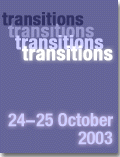
About the ColloquiumThe colloquium addressed the wide theme of ‘transitions’ in relation to the study of higher education, its practices and its impact upon society. Conceived in this way, the theme relates to the concerns of the ESRC/TLRP, especially its third phase, by engaging an interdisciplinary audience involved in a wide range of research activities relating to how we understand higher education. Such activities might include educational research, but also economic, psychological, philosophical and scientific research related to this field of study. The colloquium would thus aim to provide a stimulus to new collaborations across the disciplinary boundaries of higher education. The form of the colloquium would be transitional across disciplinary and institutional boundaries as well as in terms of its content and would demonstrate through its practice the idea of ‘mutual learning’. As indicated above, the concept of ‘transition’ applies in a range of investigations and contexts within the field of study of ‘higher education’ and transitions in the nature of knowledge might relate to disciplinary boundaries (interdisciplinarity), boundaries between print and digital representations of knowledge and transitions between theory and practice. Conceived around such (interacting) themes, the colloquium would draw upon a wide range of existing research interests and studies. Discussions have started with possible contributors to the Colloquium and a list of those interested is being drawn up. Colloquium ThemesInterdisciplinarity ‘Interdisciplinarity’ is a term that is commonly used but with little shared understanding concerning its meaning. From some perspectives, it can be viewed as a radical and intellectual challenge to come to new understandings of knowledge, theory and hence the curriculum. From other perspectives, it is seen as a pragmatic response to the rapid increase in knowledge which devalues the role of theory. From yet others, it is a notion that makes no sense now that disciplines (and the ‘grand theories’ which they express) are seen as a relic of an earlier ‘modernist’ age. Consequently, ‘interdisciplinary’ courses and research projects can be, for staff and students, highly challenging encounters between different ways of thinking; or they may consist of different types of expertise bolted together to meet (often commercially defined) problem solving needs; or they may be used to describe any intellectual work as we attempt to understand the essentially fragmented nature of knowledge. Terms like ‘interdisciplinary’, ‘multidisciplinary’ and ‘nondisciplinary’ and ‘transdisciplinarity’ are amongst the terms used to represent these different viewpoints - but such terms are often used loosely. Given the prominence that interdisciplinary groupings have in many higher education settings, some more sustained enquiry into this theme would be helpful. Questions which arise might include: What enables or blocks communication across disciplinary boundaries? Can intellectual activity transcend the discipline? How can disciplines challenge each other to re-examine their assumptions? The nature of evidence in different contexts Modern technology allows for the collection of vast quantities of data of many different kinds but the technology for combining, comparing, linking and interpreting all this information, so turning it from information to evidence, is almost non-existent. Although interpretation of evidence is as fundamental to all human enquiry as logic, and just as ancient, there has generally been little interest displayed in what counts as evidence in different disciplines and areas. This has been neglected in the conduct of apparently interdisciplinary research. Writing and language: grammar and spaces in transition There has been (surprisingly) very little research on languages in the context of the school-HE transition. There has certainly been recent debate about whether, why and how to teach grammar, not only to foreign language students but also to students studying their native language. This is relevant to the subject of transition because the place of grammar is being reconsidered in schools and further education. In the context of the colloquium, it would be interesting to explore these questions in the wider area of literacy and languages. It may be that problems related to recruiting students into HE language departments have distracted attention from the issues facing those students who do start HE courses. This theme would include consideration of issues of audience,
multimodality, identity, argumentation and would draw on UCL experience
of its Communicating in
a Digital Age course. Closing the Gap in School-University Mathematics It has been acknowledged for some time that the gap between school and university level mathematics in England has been widening, made even more apparent with the shift to a mass system of HE. This increase in the numbers of students attending university disguises the fact that the proportion of students choosing mathematically based degrees has decreased overall and that those who do so are coming from more diverse backgrounds. Research has shown that school and university have substantial differences of view concerning the nature of a given mathematical idea. Research suggests that this is in part due to school mathematics instruction traditionally focusing on the content aspect of knowledge, with what students ought to know being defined in terms of ‘chunks’ of subject matter, and characterising what a student does know in terms of the amount of content that has been ‘mastered’. An appreciation of the richness and interconnectedness of the subject is therefore one that is often hidden from incoming students who, in extreme circumstances, may understand mathematics merely as a list of techniques to apply to appropriate problems. A central challenge relates to the interconnectedness of mathematical ideas met at school and at university. Lifelong learning: transitions The idea of lifelong learning is elusive and has been heavily subject to rhetoric. Encompassing formal and informal, theoretical and practical modes of learning, complex and developmental transitions and ideas of adult learning and professional development, the research field is nonetheless patchy and one opportunity provided by the developing European research arena might be to subject this field to more critical scrutiny with the benefit of genuinely interdisciplinary approaches. It is possible that this will be attempted in the Integrated Projects of the EU FP6 programme – but the proposed colloquium provides an opportunity to raise questions about aspects of transition in lifelong learning. Terms which are used in this field – for example, context, mediation, connectivity, negotiation, boundary crossing,– mean different things within the various disciplines, roles and perspectives of the European research, policy-making and practitioner communities. Attention to meaning and a focus upon the nature and process of learning are often neglected in the research discourse and yet should engage policy makers, educationists, social partners and researchers. It may be that a new way of thinking about learning is timely, rather than rehearsing a series of ‘good practice’ measures which neglect underlying problems and questions. Further information: Toni Griffiths and Stephen Rowland telephone +44 (0) 20 7679 5939 (TG) and +44 (0) 20 7679 1936 (SR) |

